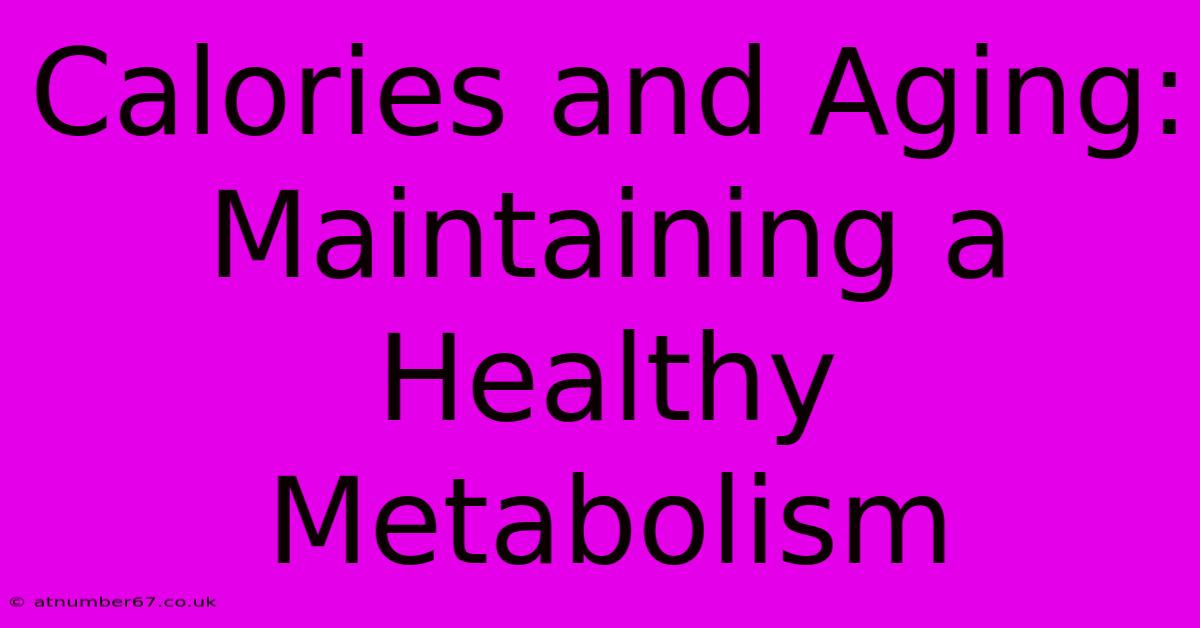Calories And Aging: Maintaining A Healthy Metabolism

Table of Contents
Calories and Aging: Maintaining a Healthy Metabolism
As we age, our bodies undergo a multitude of changes, and one of the most significant is the alteration of our metabolism. Understanding how calorie intake interacts with this aging process is crucial for maintaining a healthy weight, energy levels, and overall well-being. This article delves into the complex relationship between calories, aging, and metabolism, offering practical strategies to support a healthy metabolic rate throughout your life.
The Metabolism-Aging Connection: Why Things Change
Our metabolism, the process by which our bodies convert food into energy, naturally slows down with age. This isn't simply a matter of becoming less active; several factors contribute to this decline:
-
Decreased Muscle Mass: As we age, we tend to lose muscle mass (sarcopenia), a process that significantly impacts metabolism. Muscle tissue burns more calories at rest than fat tissue, so a reduction in muscle mass leads to a lower metabolic rate.
-
Hormonal Shifts: Hormonal changes associated with aging, particularly a decrease in growth hormone and thyroid hormone, can also contribute to a slower metabolism. These hormones play vital roles in regulating energy expenditure and body composition.
-
Reduced Physical Activity: As we get older, we may naturally become less physically active, further reducing our calorie expenditure and contributing to a slower metabolism.
-
Changes in Body Composition: The increase in body fat percentage and decrease in lean muscle mass that often accompany aging also contribute to a lower metabolic rate.
Calorie Needs Across the Lifespan: Understanding Your Requirements
Calorie needs aren't static; they change throughout life based on age, activity level, sex, and overall health. Simply maintaining the same calorie intake as you did in your younger years may lead to weight gain as your metabolism slows.
Determining your individual calorie needs requires considering several factors:
-
Age: Calorie needs generally decrease with age, particularly after age 30.
-
Activity Level: A highly active individual will require significantly more calories than someone with a sedentary lifestyle.
-
Body Composition: Individuals with more muscle mass will have higher resting metabolic rates.
-
Health Conditions: Certain health conditions can impact calorie needs. Consult your doctor or a registered dietitian for personalized guidance.
Strategies to Maintain a Healthy Metabolism as You Age
While slowing metabolism is a natural part of aging, there are several effective strategies to mitigate its effects and maintain a healthy metabolic rate:
1. Strength Training: Build and Preserve Muscle Mass
Regular strength training is crucial for combating age-related muscle loss. Building and maintaining muscle mass increases your resting metabolic rate, helping your body burn more calories even when at rest. Aim for at least two sessions of strength training per week, focusing on all major muscle groups.
2. Prioritize Cardiovascular Exercise: Boost Your Heart Rate
Cardiovascular exercise, such as brisk walking, swimming, or cycling, is essential for overall health and metabolic function. It improves cardiovascular health, boosts calorie expenditure, and helps maintain a healthy weight. Aim for at least 150 minutes of moderate-intensity cardio per week.
3. Eat a Balanced Diet: Fuel Your Body Right
A balanced diet rich in lean protein, fruits, vegetables, and whole grains is vital for a healthy metabolism. Lean protein helps preserve muscle mass, while fruits and vegetables provide essential vitamins and minerals that support metabolic processes. Limit processed foods, sugary drinks, and unhealthy fats.
4. Prioritize Sleep: Rest and Recharge
Sufficient sleep is crucial for regulating hormones that impact metabolism. Aim for 7-9 hours of quality sleep each night to support overall metabolic health.
5. Manage Stress: Reduce Cortisol Levels
Chronic stress elevates cortisol levels, which can negatively impact metabolism and contribute to weight gain. Practice stress-management techniques such as yoga, meditation, or deep breathing exercises.
6. Stay Hydrated: Water is Essential
Water plays a crucial role in various metabolic processes. Ensure you're drinking enough water throughout the day to support optimal bodily functions.
Consulting Professionals for Personalized Guidance
While the information provided here offers valuable insights, it's crucial to remember that individual needs vary greatly. Consulting with a registered dietitian or healthcare professional is highly recommended for personalized guidance on calorie intake, exercise plans, and overall health management as you age. They can help create a tailored plan based on your specific circumstances, ensuring you maintain a healthy metabolism and overall well-being throughout your life.

Thank you for visiting our website wich cover about Calories And Aging: Maintaining A Healthy Metabolism. We hope the information provided has been useful to you. Feel free to contact us if you have any questions or need further assistance. See you next time and dont miss to bookmark.
Featured Posts
-
The Enigma Of Andre Ellis
Mar 29, 2025
-
Gautam Gambhirs Age And His Unwavering Commitment
Mar 29, 2025
-
Dembeles Age And The Expectations On Him
Mar 29, 2025
-
Gavin Newsoms Son A Portrait Of Modern Youth
Mar 29, 2025
-
Malie Donns Age A Source Of Inspiration
Mar 29, 2025
